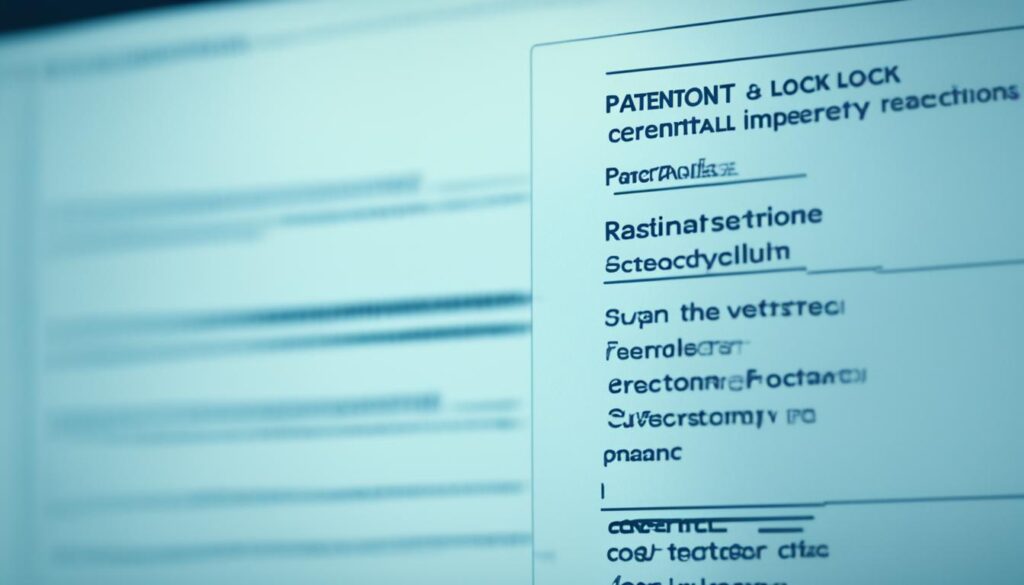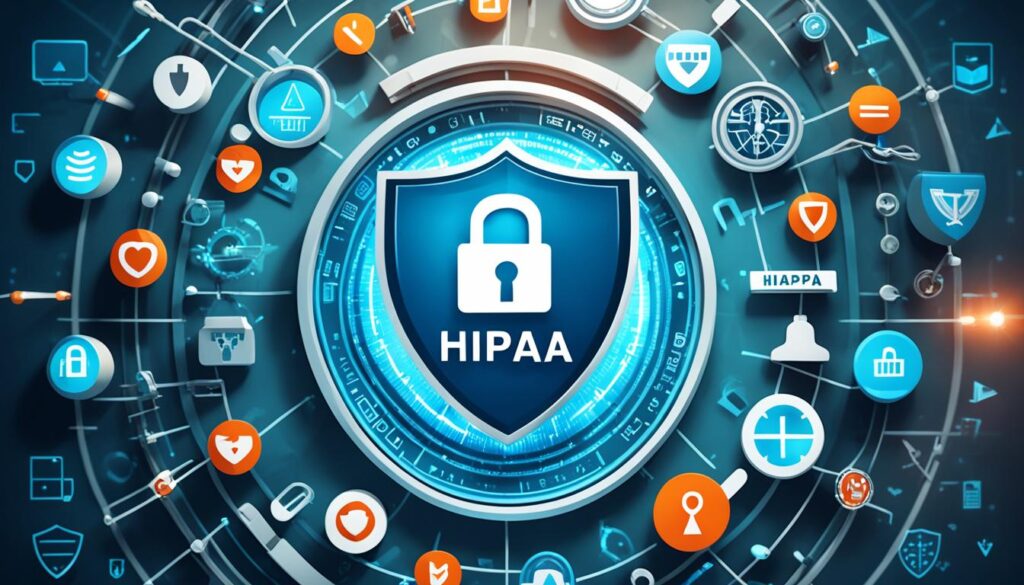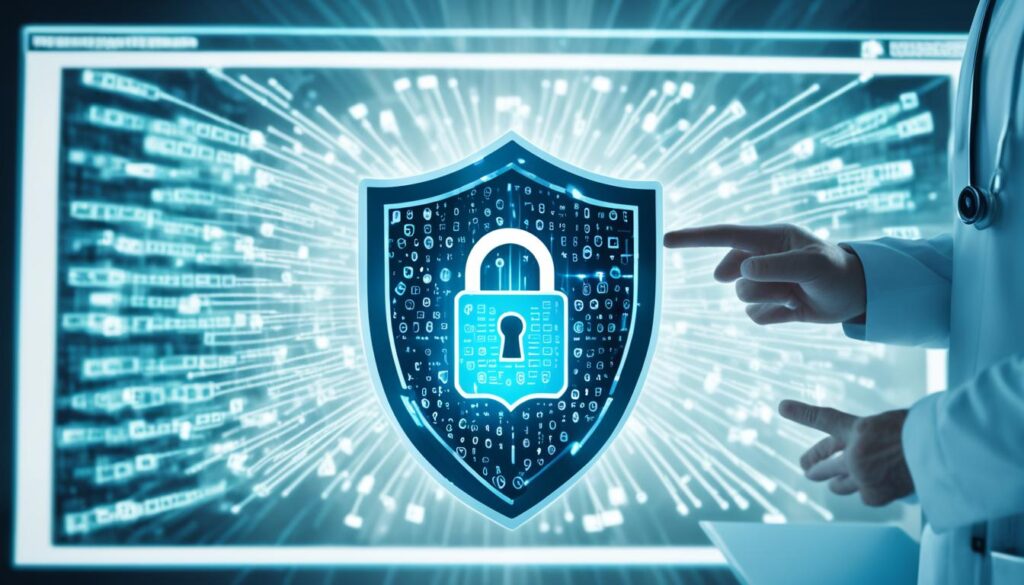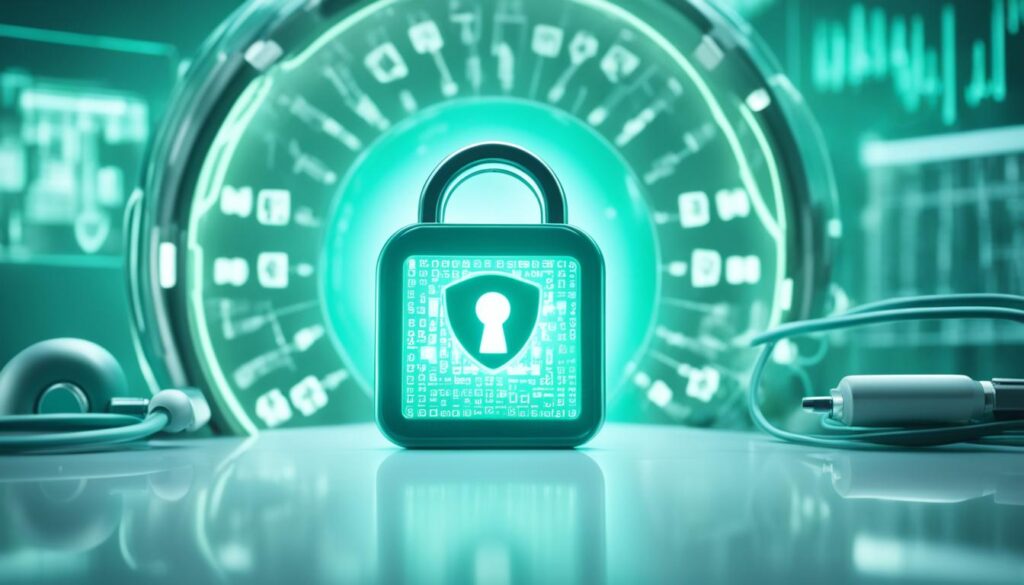In the ever-evolving world of healthcare, cybersecurity plays a critical role in protecting sensitive patient data. Healthcare organizations face constant cyber threats that can jeopardize patient safety and privacy. It is crucial for hospital leaders to view cybersecurity as a patient safety and strategic priority, integrating it into the overall risk-management framework. Healthcare organizations are particularly targeted by cyberattacks due to the valuable information they possess, such as protected health information (PHI), financial data, personally identifying information (PII), and intellectual property. The cost to remediate a breach in healthcare is significantly higher than other industries, averaging $408 per stolen healthcare record. Cyberattacks not only threaten patient privacy but also jeopardize care delivery and patient outcomes.
Key Takeaways:
- Cybersecurity is essential for protecting sensitive patient data in the healthcare industry.
- Healthcare organizations must prioritize cybersecurity as a patient safety and strategic priority.
- Healthcare data breaches can have significant financial and reputational consequences.
- Cybersecurity measures are necessary to protect patients’ privacy and ensure care delivery and patient outcomes.
- The cost of remediating a healthcare breach is higher compared to other industries, emphasizing the importance of proactive cybersecurity.
Understanding the Consequences of Neglecting Cybersecurity and Compliance
When it comes to healthcare, neglecting cybersecurity and compliance can have dire consequences. The digital fortresses of healthcare institutions, if breached, can lead to a tarnished reputation, severe financial turmoil, and potential legal repercussions. However, the stakes go beyond monetary losses; patient trust and ethical standards are also at stake when sensitive data is compromised.
In order to safeguard patient information and prevent data breaches, healthcare organizations must prioritize cybersecurity measures. By implementing robust healthcare cybersecurity solutions, organizations can mitigate risks and ensure the integrity of healthcare data.
“A breach in a healthcare institution’s digital fortress can have far-reaching consequences, impacting patient trust, financial stability, and adherence to legal requirements.”
The consequences of neglecting cybersecurity and compliance in healthcare are multifaceted. Here are some key implications:
-
Tarnished Reputation: A data breach can tarnish the reputation of healthcare organizations, leading to a loss of patient trust and confidence. Organizations that fail to protect sensitive data may find it challenging to regain their reputation, potentially losing patients to competitors.
-
Financial Turmoil: The financial consequences of a data breach can be substantial. Apart from the potential fines and legal expenses, healthcare organizations may also face significant costs associated with breach remediation, notification of affected individuals, credit monitoring services, and reputational damage control.
-
Legal Repercussions: Negligence in implementing cybersecurity measures and complying with industry regulations can result in legal repercussions. Healthcare organizations may face lawsuits from affected patients, regulatory investigations, and penalties for non-compliance.
Given these dire consequences, it is essential for healthcare organizations to prioritize cybersecurity solutions aimed at preventing data breaches and protecting patient information.
Mitigating Cybersecurity Risks in Healthcare
Implementing robust healthcare cybersecurity solutions is crucial for mitigating risks and ensuring the integrity of healthcare data. Here are some key strategies:
| Strategies | Description |
|---|---|
| Multi-factor Authentication | Implementing multi-factor authentication adds an additional layer of security, requiring users to provide multiple forms of identification before accessing sensitive data. |
| Encryption | Encrypting sensitive data at rest and in transit protects it from unauthorized access. It ensures that even if the data is intercepted, it cannot be deciphered without the proper decryption key. |
| Regular Security Audits | Conducting regular security audits helps identify vulnerabilities and weaknesses in the healthcare organization’s systems and processes. This allows for timely remediation and proactive risk management. |
| Employee Training | Educating employees about cybersecurity best practices and raising awareness about potential risks can help prevent breaches caused by human error, such as phishing attacks or improper data handling. |
| Secure Network Infrastructure | Building a secure network infrastructure with firewalls, intrusion detection systems, and regular patch management can help protect against external threats and unauthorized access. |
Safeguarding Healthcare Documents Through Cybersecurity Measures
Safeguarding healthcare documents requires the implementation of robust cybersecurity measures. To effectively protect patient information, it is essential to understand the mindset of cyber attackers and their methods. Encryption emerges as a crucial defense mechanism to safeguard the privacy of patient records. By encrypting healthcare documents, sensitive information remains secure, even if unauthorized individuals gain access to the data.
Compliance with regulations, such as HIPAA, is vital in navigating the regulatory landscape and ensuring patient confidentiality. HIPAA (Health Insurance Portability and Accountability Act) sets standards for the protection of sensitive medical information. By complying with HIPAA regulations, healthcare organizations demonstrate their commitment to maintaining the privacy and security of patient records.
It is crucial for healthcare organizations to strike a delicate balance between security and accessibility. While robust security measures are essential, it is equally important to ensure authorized individuals can access healthcare documents efficiently. Secure collaboration platforms play a significant role in achieving this balance. These platforms provide the means for healthcare professionals to share vital information securely, minimizing the risk of unauthorized access.

The Role of Artificial Intelligence (AI) in Healthcare Cybersecurity
Artificial intelligence (AI) serves as a vigilant guardian, identifying potential threats and protecting patient data. AI-powered algorithms can analyze vast amounts of data, detecting patterns, anomalies, and potential cybersecurity risks in real-time. By leveraging AI technology, healthcare organizations can proactively respond to emerging threats, preventing data breaches and safeguarding medical records.
The Importance of Secure Collaboration Platforms
In the age of digital health, secure collaboration platforms are essential for sharing healthcare documents while ensuring authorized access. These platforms provide a centralized space where healthcare professionals can collaborate, securely exchange information, and streamline workflows. Implementing secure collaboration platforms enhances efficiency, promotes collaboration, and protects the privacy of patient records.
Quotes: Expert Insights on Healthcare Document Security
“The protection of patient information is paramount in the healthcare industry. Robust cybersecurity measures, such as encryption and secure collaboration platforms, are crucial for safeguarding healthcare documents.” – Dr. Emily Johnson, Chief Information Officer at XYZ Medical Center
Key Takeaways
- The implementation of robust cybersecurity measures is necessary to safeguard healthcare documents.
- Encryption is a crucial defense mechanism in protecting the privacy of patient records.
- Compliance with regulations, like HIPAA, ensures patient confidentiality.
- Secure collaboration platforms enable authorized access while maintaining security.
- Artificial intelligence plays a vital role in identifying and preventing cybersecurity threats in healthcare.
Reducing Security Risks Through Effective Strategies
Healthcare organizations face constant cybersecurity risks that can jeopardize the protection of sensitive patient data. To mitigate these risks, organizations need to implement effective strategies that prioritize HIPAA compliance measures and healthcare cybersecurity solutions.
Elevating Cyber Risk as an Enterprise and Strategic Risk-Management Issue
One of the crucial first steps in reducing security risks is to elevate cyber risk as an enterprise and strategic risk-management issue. This means acknowledging the importance of cybersecurity at all levels of the organization, from the boardroom to frontline staff. By integrating cybersecurity into the overall risk-management framework, healthcare organizations can ensure that cybersecurity measures are given the necessary attention and resources.
Instilling a Patient Safety-Focused Culture of Cybersecurity
Creating a patient safety-focused culture of cybersecurity is essential for mitigating cyber risks. It involves promoting awareness among healthcare professionals about the importance of protecting sensitive patient data and the potential consequences of data breaches. Through training programs and regular communication, healthcare organizations can ensure that all staff members are educated on cybersecurity best practices and actively contribute to keeping patient information secure.
Seeking Assistance from Cybersecurity Advisors and Conducting In-Depth Risk Assessments
Healthcare organizations can benefit from seeking assistance from cybersecurity advisors who specialize in healthcare cybersecurity solutions. These experts can provide valuable insights and guidance on implementing effective security measures and addressing vulnerabilities. Additionally, conducting in-depth risk assessments can help identify potential security gaps and provide tailored recommendations to mitigate risks.
Compliance with HIPAA Regulations
Compliance with HIPAA regulations is a critical component of reducing security risks and protecting sensitive patient data. Healthcare organizations must adhere to HIPAA requirements, which include implementing administrative, physical, and technical safeguards for electronic protected health information (ePHI). By complying with HIPAA, organizations can prevent data breaches, avoid penalties, and ensure the privacy and security of patient information.

| Effective Strategies for Reducing Security Risks | Benefits |
|---|---|
| Elevating Cyber Risk as an Enterprise and Strategic Risk-Management Issue | – Ensures cybersecurity measures are given necessary attention and resources – Integrates cybersecurity into the overall risk-management framework |
| Instilling a Patient Safety-Focused Culture of Cybersecurity | – Increases awareness about the importance of protecting patient data – Educates staff on cybersecurity best practices |
| Seeking Assistance from Cybersecurity Advisors and Conducting In-Depth Risk Assessments | – Provides expert guidance on implementing effective security measures – Identifies vulnerabilities and offers tailored recommendations |
| Compliance with HIPAA Regulations | – Protects sensitive patient data from unauthorized access – Prevents data breaches and avoids penalties |
Strengthening EHR Security to Protect Patient Information
Electronic health records (EHRs) are essential in healthcare, but they are vulnerable to security concerns that can compromise patient privacy. It is crucial to strengthen EHR security to protect sensitive patient data from unauthorized access and manipulation.
One effective strategy to enhance EHR security is the implementation of encryption. Encrypting patient information adds an extra layer of protection, making it significantly more challenging for cybercriminals to gain access to sensitive data. Additionally, implementing two-factor authentication provides an extra level of security by requiring users to provide two different forms of identification before accessing the EHR system.
“By strengthening EHR security, healthcare organizations can safeguard patient information, preventing data breaches and potential harm to patients.”
Strict access control measures are crucial in ensuring that only authorized individuals can access EHRs. Controlling access rights based on roles and responsibilities minimizes the risk of unauthorized users gaining access to patient data. Regularly reviewing and updating access privileges is essential to maintain the integrity and confidentiality of patient information.
Human errors are a common cause of data breaches in healthcare. It is essential to provide regular staff training in cybersecurity best practices to raise awareness and prevent breaches arising from simple mistakes. By educating employees on potential risks and promoting privacy-protection awareness, healthcare organizations can significantly reduce EHR security risks.
Protecting Patient Privacy with Enhanced EHR Security
EHR security is a critical aspect of protecting sensitive patient data in the digital age. By implementing robust security measures such as encryption, two-factor authentication, and strict access controls, healthcare organizations can safeguard patient information from cyber threats.
Table: Benefits of Strengthening EHR Security
| Benefits | Description |
|---|---|
| Enhanced Privacy | Protects sensitive patient data from unauthorized access. |
| Reduced Breach Risk | Prevents data breaches, minimizing potential harm to patients. |
| Compliance with Regulations | Ensures adherence to HIPAA and other regulations governing patient data security. |
| Improved Patient Trust | Increases patient confidence in healthcare organizations’ ability to protect their privacy. |

Strengthening EHR security is an ongoing process that requires constant monitoring and adaptation. By prioritizing EHR security and implementing comprehensive cybersecurity solutions, healthcare organizations can effectively protect sensitive patient data, maintain patient privacy, and uphold the trust patients place in them.
The Importance of Compliance in Healthcare Data Security
Compliance with regulations, such as HIPAA, is of utmost importance in ensuring healthcare data security. Healthcare organizations must navigate the complex regulatory landscape and adhere to standards that protect sensitive patient data.
HIPAA rules serve as a moral compass, guiding healthcare institutions in prioritizing patient confidentiality. Understanding the specific requirements for securing patient data and implementing appropriate security measures is essential in maintaining compliance.
Regular audits, risk assessments, and training programs can help healthcare organizations stay up to date with compliance requirements and mitigate potential security risks.
Protecting sensitive patient data and ensuring healthcare data security should be a top priority for all healthcare organizations, as it not only safeguards patient privacy but also maintains trust and confidence in the healthcare system.
“Healthcare organizations must take proactive measures to protect patient privacy and comply with regulations. Failure to do so can lead to severe consequences, including financial losses and damaged reputation.”
The Role of HIPAA Compliance Measures
HIPAA (Health Insurance Portability and Accountability Act) sets the standard for protecting sensitive patient data in the healthcare industry. By implementing HIPAA compliance measures, healthcare organizations can ensure the confidentiality, integrity, and availability of patient information.
HIPAA compliance measures encompass a range of safeguards, including administrative, physical, and technical safeguards, to protect patient data from unauthorized access, use, and disclosure. These measures involve policies, procedures, and controls that healthcare organizations must implement to comply with HIPAA regulations.
The Benefits of HIPAA Compliance
Complying with HIPAA regulations offers numerous benefits for healthcare organizations:
- Protecting Sensitive Patient Data: HIPAA compliance measures ensure that patient data is securely stored, accessed, and transmitted, safeguarding it from potential cyber threats.
- Building Patient Trust: Demonstrating compliance with HIPAA regulations builds trust and confidence among patients, assuring them that their sensitive information is being protected.
- Avoiding Penalties: Compliance with HIPAA regulations helps healthcare organizations avoid costly fines and penalties associated with data breaches and non-compliance.
- Enhancing Reputation: Maintaining a strong reputation for data security and patient privacy can differentiate healthcare organizations in the competitive healthcare market.
By prioritizing HIPAA compliance measures, healthcare organizations can ensure the security and privacy of sensitive patient data, maintain regulatory compliance, and establish a solid foundation for building patient trust.

Conclusion
In today’s complex healthcare landscape, protecting sensitive patient data through robust cybersecurity solutions is of utmost importance. With cyber threats constantly evolving, healthcare organizations must prioritize cybersecurity measures to safeguard patient privacy and ensure data integrity. Compliance with industry regulations, such as HIPAA, plays a crucial role in maintaining the confidentiality of patient information.
By implementing effective security measures, healthcare institutions can mitigate the risks of data breaches and protect the sensitive information of their patients. Encryption, two-factor authentication, strict access control, and regular staff training are essential components of a comprehensive healthcare cybersecurity strategy. It is crucial for healthcare organizations to stay vigilant and proactive in their approach to cybersecurity to keep up with advancing technology.
Protecting sensitive patient data is not just a responsibility; it is a critical step in ensuring the continued delivery of high-quality care. As cyber threats continue to increase, healthcare institutions must invest in healthcare cybersecurity solutions to safeguard patient information, maintain trust, and uphold ethical standards. By prioritizing cybersecurity, healthcare organizations can protect patient privacy, maintain data integrity, and promote safety in the ever-evolving digital healthcare landscape.
FAQ
Why is cybersecurity important for healthcare?
Cybersecurity is crucial for healthcare because it protects sensitive patient data from cyber threats. Healthcare organizations possess valuable information, such as protected health information (PHI) and personally identifying information (PII), making them a target for cyberattacks. Neglecting cybersecurity can lead to data breaches, jeopardizing patient safety, privacy, and care delivery.
What are the consequences of neglecting cybersecurity and compliance in healthcare?
Neglecting cybersecurity and compliance in healthcare can result in a tarnished reputation, financial turmoil, and potential legal repercussions. Patient trust and ethical standards are at stake when sensitive data is compromised. It is vital for healthcare organizations to prioritize cybersecurity measures to prevent data breaches and protect patient information.
How can healthcare documents be safeguarded through cybersecurity measures?
Healthcare documents can be safeguarded through robust cybersecurity measures. Encryption, compliance with regulations such as HIPAA, and the use of secure collaboration platforms are effective strategies in protecting patient information. Artificial intelligence also plays a role in identifying potential threats and protecting patient data.
What strategies can be used to reduce security risks in healthcare?
Healthcare organizations can reduce security risks by elevating cyber risk as an enterprise and strategic risk-management issue. This involves having dedicated leadership, regular updates on the organization’s cyber risk profile, and a patient safety-focused culture of cybersecurity. Seeking assistance from cybersecurity advisors and conducting risk assessments are also recommended.
How can EHR security be strengthened to protect patient information?
EHR security can be strengthened through the implementation of encryption, two-factor authentication, and strict access control measures. Regular staff training in cybersecurity best practices is essential to prevent breaches arising from human errors. Promoting privacy-protection awareness and educating staff on potential risks can significantly reduce EHR security risks.
Why is compliance important in healthcare data security?
Compliance, especially with regulations such as HIPAA, is vital in ensuring healthcare data security. Healthcare organizations must navigate the complex regulatory landscape and adhere to standards that protect sensitive patient data. Understanding and implementing appropriate security measures is crucial in maintaining compliance and preventing data breaches.
What is the importance of protecting sensitive patient data through cybersecurity?
Protecting sensitive patient data through cybersecurity is crucial for maintaining patient privacy and trust in the healthcare system. Cyber threats continue to evolve, making it necessary for healthcare organizations to prioritize cybersecurity measures. By implementing effective security measures, healthcare organizations can mitigate the risks of data breaches and protect the sensitive information of their patients.








